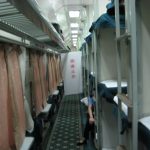Riding That Train (坐火车) Posted by Stephen on May 31, 2011 in Uncategorized
 Trains or 火车 [huǒchē] (literally translating as “fire carts”) are a point of pride among the Chinese–and for good reason. They are a huge source of travel and transport for people and freight in China as highway and road development is still lagging outside of most urban centers. When you think about it, it makes sense. China is still developing it’s infrastructure and energy sectors, so any mode of transport reliant upon coal is a natural fit in the Chinese domestic economy.
Trains or 火车 [huǒchē] (literally translating as “fire carts”) are a point of pride among the Chinese–and for good reason. They are a huge source of travel and transport for people and freight in China as highway and road development is still lagging outside of most urban centers. When you think about it, it makes sense. China is still developing it’s infrastructure and energy sectors, so any mode of transport reliant upon coal is a natural fit in the Chinese domestic economy.
Yet there is more to this love affair with trains than economic development. Historically, Chinese immigrants were the first to build the series of east-to-west-coast rails throughout the United States, tying them historically to notions of “western expansion” and “Manifest Destiny” during the late 19th century. While most Americans are unaware of or neglect this fact, the Chinese-built rail system was paramount to United States development and industrialization. I find it interesting that more than 150 years later, China is now the global leader in rail transit development, and the largest producer (including exports) of trains and train technology and the leader in future train projects throughout the globe.
You name it, China leads the industry in it. High speed rail, freight transport, commuter transport–they even have a train that doesn’t ever stop moving in the works:
The Chinese export a bulk of their technology to the U.S., Canada and are even proposing projects connecting the E.U. with Russia and China. Clearly they’ve cornered the industry, and will have a huge influence on train technology in decades to come.
Riding That Train (坐火车)
But for the everyday people or 老百姓 (lǎobǎixìng), a train is almost always the cheapest 最便宜 (zuìpiányi), most convienent 最方便 (zuìfāngbiàn), and definitely the most interesting 最有意思 (zuìyǒuyìsi) way to travel in China.
You meet people (mainly because you have to), swap stories and make fast friends. You get a rare glimpse at the vast expanses of countryside, agriculture, terrain, mega-factories and industrial plants that escape most urban centers. You cram your way through the masses, lie awake wide-eyed through the snoring and ringing of cell phones and guzzle down 白酒 with migrant workers that have never met a 老外 in person, let alone play cards with one.
You want a real Chinese experience? Take a ride on a hard-sleeper or 硬卧 (yìngwò). Forget the fancy tour guides, the lavish hotels and first class airlines. To me, the train is the perfect metaphor for China: a behemoth of steel, gears and coal, crammed full of people all barreling forward on a single track to the same end.
Getting tickets isn’t very difficult, but it does require some pre-planning. During holidays or peak tourist times of the year it may be impossible to get any kind of train ticket. My advice is to search online first, finding out which train you want (they are catagorized by a letter of the alphabet, and a number, for example the D31 train is from Beijing to Shanghai). Then go to one of thousands of travel agent locations or go directly to the train station and buy your ticket. If they don’t have it, see what other dates/times or trains work. Odds are you’ll find one within two to three days of your expected travel date.
 Then all you have to do is go to the departing station, go through security (which usually takes about 10 minutes max), and sit tight in a waiting room. While there you can buy McDonalds, KFC or Chinese fast food, while stocking up on snacks, booze or books for the ride. There are food carts on the trains too, so don’t stress. Just get on that train, stow away your belongings, and get ready for an experience.
Then all you have to do is go to the departing station, go through security (which usually takes about 10 minutes max), and sit tight in a waiting room. While there you can buy McDonalds, KFC or Chinese fast food, while stocking up on snacks, booze or books for the ride. There are food carts on the trains too, so don’t stress. Just get on that train, stow away your belongings, and get ready for an experience.
Train travel, or 火车旅游 (lǚ yóu), is divided among a few catagories. You can either grab a seat or a sleeper cart. Seats are cheaper and are divided into hard-seaters (硬座,yìngzuò) which is just as unpleasant as it sounds (usually no AC, crowded and loud), or soft-seaters (软座 ruǎnzuò) which are in-fact softer, the seats recline, have AC and give more elbow space. The difference is in price, with most hard-seaters being about 100 kuai less for long trips. However, if you are looking for a bullet train, or High Speed Train (高速火车 gāo sù huǒ chē), soft seaters are usually all you can find, as the average high speed train from Beijing to Shanghai costs around 250-300 块.
But for those long (6-plus hour rides), I say why not travel in comfort? Why not take a sleeper train and get a true China experience out of it? Sleeper trains are essentially cabin trains with “barracks” for sleeping in.
On hard-sleeper or 硬卧 (yìngwò) trains, there are six cots to a cabin, which means you get nice and cozy with your bunk-mates. On soft-sleepers, depending upon what degree of luxury you want, it is either four cots with private AC and intercom, or two beds, with amenities and even a TV. The price difference can vary greatly between soft and hard sleepers, but for around 200-300 块 you can ride a hard sleeper from one geographical location of China to another. Additionally, most trains leave around 7-9 pm, meaning that you can eat, have a drink, read, play cards, party etc… in your cabin, and then retire to your bunk sleeping out the the remaining travel time. You’ll wake up feeling somewhat refreshed and already at your destination.
 Riding a sleeper train is also the perfect way to practice your Chinese, get caught up on current events in China, and converse with some interesting 老百姓. Most of the people you meet on trains are tourists, from all corners of China. They have different dialects, accents and customs. They may have never met a foreigner, and may be baffled to learn you can speak Chinese. Use this to your advantage, ask them about their hometown or (), tell them about your experience in China. You may find yourself learning a great deal about an area that you aren’t even headed towards. Talk about killing two birds with one stone or 一举两得.
Riding a sleeper train is also the perfect way to practice your Chinese, get caught up on current events in China, and converse with some interesting 老百姓. Most of the people you meet on trains are tourists, from all corners of China. They have different dialects, accents and customs. They may have never met a foreigner, and may be baffled to learn you can speak Chinese. Use this to your advantage, ask them about their hometown or (), tell them about your experience in China. You may find yourself learning a great deal about an area that you aren’t even headed towards. Talk about killing two birds with one stone or 一举两得.

Build vocabulary, practice pronunciation, and more with Transparent Language Online. Available anytime, anywhere, on any device.
About the Author: Stephen
Writer and blogger for all things China related. Follow me on twitter: @seeitbelieveit -- My Background: Fluent Mandarin speaker with 3+ years working, living, studying and teaching throughout the mainland. Student of Kung Fu and avid photographer and documentarian.





Comments:
Marcus Scott:
我记得坐西安的火车。我没想到中国的火车那么挤阿!我想跟我的一个朋友去火车上的餐馆吃夜宵,但是从我们的硬卧走到餐馆太难了。我以为乘客都会坐在别人的旁边,但是在过道却站着四十多个人,我连路都走不动耶!中国的火车挤得水泄不通.关于硬卧,硬卧都很舒服,而且你能把你的东西放在床下。我很高兴有机会坐火车(虽然我这辈子再也不会坐中国的火车。就像我刚才所说的,经历很有趣,但是火车太拥挤了,这让觉得太不舒服了。